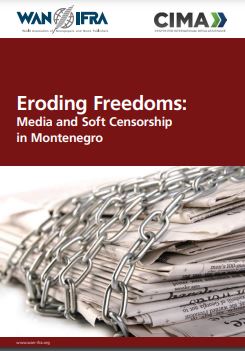Eroding Freedoms: Media and Soft Censorship in Montenegro
Eroding Freedoms: Media and Soft Censorship in Montenegro
Author(s): Vladimir Vučković, Ana Vujošević
Contributor(s): Thomas R. Lansner (Editor)
Subject(s): Politics, Media studies, Governance, Policy, planning, forecast and speculation
Published by: Centar za građansko obrazovanje (CGO)
Keywords: Montenegro; media; censorship; soft censorship; politics; governance; democratization;
Summary/Abstract: In Montenegro, soft censorship is exercised primarily through politicised, discretionary and non-transparent distribution of public money and subsidies to media. Lack of transparency and standard and equitable procedures in allocation of public funding seriously distorts the media market, improving business prospects of some outlets and endangering the existence of others. This is directly related to how favourably or critically media outlets report on governmental activities. The media landscape in Montenegro is deeply and widely politicised. A sharp division between “supporters” and “critics” of state policies has grown more vivid in recent years. There are on-going attempts to diminish the influence of some media outlets on the Montenegrin public. “Hard censorship” has included violence against journalists—the murder of the editor-in-chief of daily Dan, Dusko Jovanovic, on 27 May 2004, remains unresolved, as do most attacks on journalists and on media property, which doubtless evokes self-censorship among media practitioners concerned with self-preservation.2 Much more common in recent years is soft censorship: indirect, often financial pressures, intended to weaken the capacities and even threaten the viability of targeted media outlets that criticize the government. “Soft censorship” is defined as an attempt by government to influence media reporting through various forms of pressures, without recourse to legal bans, open censorship of news content or direct physical attacks against media infrastructure or journalists. The notion of “soft censorship” as a form of official pressure on media is detailed in a 2005 paper by the Open Society Justice Initiative. It describes three principal forms of soft censorship: abuse of public funds and monopolies, abuse of regulatory and inspection authorities, and paralegal pressures.3 All these exist in Montenegro today. Additional reports by WAN-IFRA and the Center for International Media Assistance have raised awareness of this escalating problem.4 This paper catalogues the forms and maps the extent of soft censorship by Montenegro’s state and public institutions against media outlets and media practitioners. This is done primarily through the lens of finances, which is the dominant means of soft censorship in the country. Included is an overview of instruments that facilitate or limit official financial support: allocation of advertising services by public institutions to favoured media; selective distribution of subsidies and other state aid; paid content; and other forms of administrative and technical assistance or obstruction. The study covers public institutions relevant to media and soft censorship across the three branches of government, as well as other sociopolitical actors significant to understanding this problem in the Montenegrin context. The research team faced several challenges; no such research has been conducted before, and information from public sources was in many cases limited or released only very slowly. Moreover, the topic is taboo to many journalists who fear criticizing media owners or the government, and who sometimes have scant awareness of the mechanisms and impact of soft censorship. The lack of transparent and consistent procedures for distribution of public funds to media has substantial influence on media freedoms in Montenegro. This report presents evidence that public institutions have sought to manipulate media outlets and influence their editorial policies by selective and non-transparent financing. This also seriously undermines competition and inhibits development of a sustainable media market. Opacity in state media funding is aggravated by an inadequate implementation of the legal framework for media support, further opening opportunities for official actors to exploit media for partisan purposes. This report describes various means for distributing public funding to media through which political actors exercise control or pressure on media content and viability. It analyses mechanisms of potential influence of public institutions on media editorial policies, and gives examples of abuse of public funds to manipulate media reporting to pursue partisan political goals. This report’s key findings summarize challenges concerning soft censorship in Montenegro. Its recommendations urge actions that would reverse the erosion of media freedom in Montenegro—and improve prospects for development of free independent and pluralistic media that could provide the accurate, impartial reporting on activities of the government, political parties and other institutions required to promote democratisation of Montenegrin society and governance.
Series: CGO - Demokratija
- Page Count: 23
- Publication Year: 2015
- Language: English
- Content File-PDF

